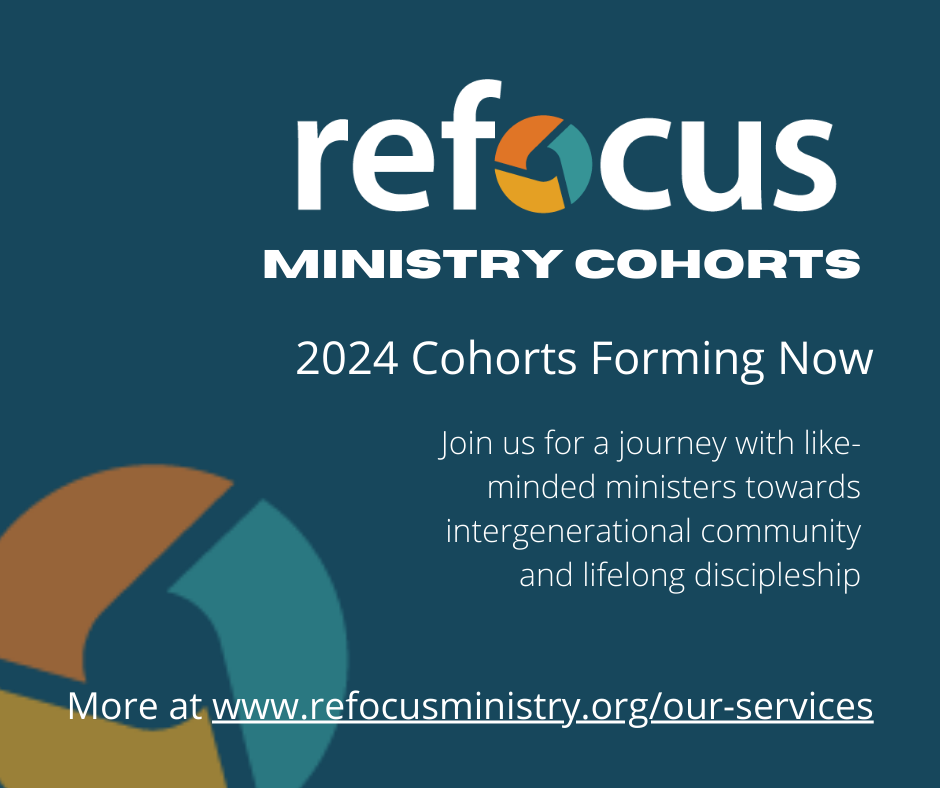This past week, our ReFocus Ministry Cohort dug deep into the messages that space and architecture send to us about who is and who is not welcome in a space. Now, we all know that communication is more than just words. Communication takes many forms, from verbal to nonverbal, intentional to unintentional, systemic to institutional. The way we do the things we do speaks volumes. The words we use pale in comparison to the actions we take and the method by which we take them.
In my last few years of observing how we go about discipleship in church, removing the words of welcome and community, and only looking at the methods and actions, it’s becoming clearer to me that one reason the church is losing the rising generations is due in part to the fact that they only accept the love they’ve been told they deserve. In his book, The Perks of Being a Wallflower, author Stephen Chbosky wrote, “We accept the love we think we deserve.” I’ve seen this posted as inspirational memes and quotes on people’s walls for years but it wasn’t until I started really digging into generational discipleship that I saw how this concept plays out in ministry, especially in intergenerational relationships within the community of faith.
Stripped of our words, our mission statements and our stated values, what do our churches often communicate to the generations who regularly attend?
My Space, Your Space
If we look at most church buildings, we will tend to find wings that are set apart by age, often down hallways or even separated by floors, much like school buildings or nursing homes in society. One common space, the sanctuary, can be a place where all ages gather but in many cases that doesn’t happen frequently. Other common spaces such as the lobby or the gym or family life center allow for all generations to be present but don’t offer ways of connection unless that is intentionally built into the expectation i.e. tables of various heights for conversation, bulletion boards designed for connection and interaction, etc.
In one case study, churches with less space available for generational overlap reported less interaction and lack of relationship-building within their church. One church simply stated, “The church doesn’t have gathering spaces that are open enough to welcome groups. Most folks come in and then go out. There is no opportunity to easily co-mingle.” Another church, which labeled itself as age-specific in every construct, noted “The church building only has one space for multi-generational connection and that is the worship space.” And another shared, “Everything except for the [lobby] and the one worship service is age- segregated.” The availability of space for interaction seem to impact the other constructs in a unique way as those churches with the least amount of multi-generational space also had the most “age-specific” descriptors as their answer
Connect Generations Survey, 2022
My Service, Your Service
A lot of churches have at least two if not more services and often those services look and sound different (contemporary, traditional, blended, etc.). Frequently these services become equally age segregated simply by the fact that they are intended to reach specific age groups or worship preferences. While we all may intuitively know this, the research makes it clear.
When compared to other generations, Elders are the most likely to choose hymns (66% vs. 45% Boomers, 32% Gen X, 19% Millennials) and a traditional style (62% vs. 51% Boomers, 39% Gen X, 38% Millennials) for worship services. On the other hand, after traditional worship, Millennials gravitate toward lively (30% vs. 21% Gen X, 23% Boomers, 15% Elders) and charismatic worship, (18% vs. 13% Gen X, 10% Boomers, 9% Elders), but also show greater openness than older adults toward a more contemplative form (17% vs. 8% Gen X, 9% Boomers, 8% Elders).
Barna Group. 2020
My Time, Your Time
When describing worship experiences, often people will say it is their time in the week to connect with God, to be renewed and refreshed, to have a personal experience. Distractions and discomfort is often minimized during the service time to allow for that so that even when we are together, we are essentially alone, but occupying the same space.

A quick Google search on the topic of “Distraction free worship” reveals article after article with tips and tricks on how to make your church’s worship time distraction-free. It is a goal of many churches to ensure that things go off without a hitch. An all-age approach to worshiping together virtually throws that goal out the window. Church can’t be about getting what we need personally to make it through the week. It must be about what we, the body of Christ communally, needs to thrive throughout our whole life.
My Church, Your Church
Having served on four church staffs and having consulted and coached with many more, this is something that repeatedly comes up, namely, the idea that within a church there may be two or more distinct faith communities based on age, likes/dislikes, and preferences and that people in these groups don’t even know the people in the other groups. One church I worked with once described their church as “Five Churches under one roof.”
It is not unusual for children’s ministries,. youth ministries, young adult ministries, and adult education ministries to have their own mission statements, separate from the church’s overall mission statement and thus all areas are pursuing different goals and different outcomes. Each have their own curriculum, are learning their own Scriptures, sharing their own songs, and establishing their own community. Rather than being “the” church together, each area has its own context – it is it’s own church.
So what does this have to do with accepting the love we think we deserve?
Well, if we say things like, “We welcome all ages into our community” but the proceed to navigate the children to one area, the youth to another, the adults to yet another, and the seniors to another, the communication then becomes, “We welcome all ages to go to these spaces and with these people in our community.” It is hard then to enter a space that isn’t “ours” even if we hear that we are welcome. It is hard for a high school graduate to walk into a sanctuary where she may only know a handful of people and a smattering of songs and a couple of hymns and feel like she belongs there. It is difficult for an older person to walk into a contemporary service where most of the younger families are gathered when he doesn’t know the songs, can’t hear above the music, and doesn’t know most of the attendees. Words of welcome cannot belay a culture of separation.
Creating common spaces that signal connection, welcome, and community takes time and intentionality. But combined with our words, the cohesive communication will signal that our goal truly is bringing people together in a place of belonging. All ages, all stages, all generations.
Fall 2024 ReFocus Cohort Forming Now!

We are ready to put together our ReFocus Ministry Cohort for Fall 2024 and would love to have you be a part of this transformational experience!
*Who should join?* – ReFocus cohorts are appropriate for anyone serving in a ministerial context. The 12-week program includes weekly Zoom meetings, resources and materials for study, access to the Connect Generations Ministry assessment, and ongoing coaching for the participant and/or their church.
*Why should you join?* – If we keep doing what we’ve always done, we will always get what we’ve always got. If you are ready to think beyond the “church growth box” and move into the “make lifelong disciples” culture, this is the place for you. It’s not church as usual – it’s understanding the culture we are in, the practice of spiritual formation, and the formation of faith across generations rather than in siloed ministry areas.
*How to I join?* – Simply fill out the interest form linked here and we will reach out with more details and information on who to join this cohort!

About the Founder of ReFocus Ministry
Christina Embree is the founder and director of ReFocus Ministry. She holds a masters in ministry focused on Children, Youth, and Family Ministry and a doctorate in spiritual formation with a focus on age segregation and intergenerational ministry.
In addition to coaching churches of multiple denominations and traditions all around the globe, Christina serves as the Minister of Generational Discipleship for the Great Lakes Conference of the Brethren in Christ and as Next Gen pastor at Open Door Church in Lexington, Kentucky.
She is widely recognized as a speaker and author in the areas of generational discipleship, intergenerational ministry, and family ministry. As the mother of three children, she is familiar with the challenges of faith at home and pastoral ministry. She along with her husband Luke share a love for the church, their community, and the global work of peace and restoration through Jesus.
Interested in having Christina visit your church, speak at your conference, or coach your team?
Christina speaks on a wide range of topics related to children, youth, and family ministry with a unique focus on connecting generations for discipleship within your church. Her personalized approach allows you to pinpoint the needs of your community and gain the insight that you are looking for. Whether this is a volunteer team training and pastoral staff meeting or a ministerial conference, her experience and knowledge will help you determine the next step forward in creating lifelong disciples.



